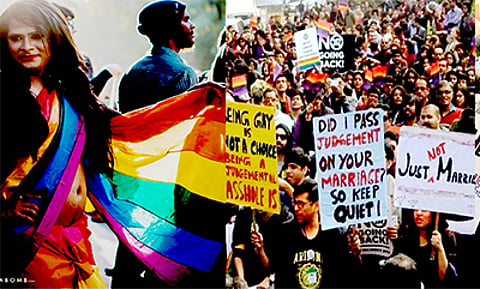

[dropcap]N[/dropcap]ow that the hearing of the case on the constitutional validity of Section 377 of the Indian Penal Code is over, we don't have to debate what the verdict is going to be. That is a foregone conclusion. The Supreme Court will decriminalise consensual same sex relations amongst adults in private. The law of British vintage, from 1861, will be given a burial once and for all. There is no doubt about that in my mind. We have to only wait for the verdict.
That is for three reasons. First, the earlier judgment of the Supreme Court in Suresh Kumar Koushal (Koushal) was, no further explanation needed anymore, poorly written — ignoring the precedents of the Supreme Court itself, and in ignorance of the changes in the rape law — a non-starter. It was bound to be set aside sooner or later. Secondly, the first nail in the coffin of Koushal was the Supreme Court's judgment in the privacy case — the Puttuswamy case — which made it clear that the issue of privacy was wrongly dealt with in Koushal.
Thirdly, the nature of the questions in the recent hearing before the Supreme Court clearly revealed the mind of the judges. They were clearly of the view that Koushal was wrongly decided. Any doubt would have been set to rest when the Government, obviously seeing the trend of the court, submitted that it would leave the fate of Section 377 to the wisdom of the Court.
The only issue that remains is this: to what extent will the language of the judgment go to pave the way to address the challenges in the future? And there are a lot of challenges.
Firstly, there will be the major one the issue discrimination. Whereas in the public sector, the Constitutional provisions on equality can address these and discrimination can be invoked, there is a complete absence of any law regulating discrimination on any account in the private sector. Equality, being the overarching Constitutional value in our society, there is a need to have a general anti-discrimination law applicable to the private sector also which does not discriminate against persons and treats them alike. The only criteria ought to be the functional fitness. This should be applicable to all historically discriminated groups as well the marginalised groups.
But for the LGBTQI, there are other major issues.
Sexuality is another major issue. Rape law in India, Section 375 IPC, is gender specific. Man is a rapist and the woman the victim. Rape law only applies to non-consensual sexual acts between a man and woman. However, there is no rape in law to address non-consensual a sexual acts between adults who may be, man and a man, man or a woman and a transgender person, transgender and transgender, and woman and woman.
Interestingly, however, while before 2013, the provision for rape only applied in case of penile-vaginal sexual intercourse without consent, now all sexual acts are covered, penile non-vaginal also as well non penile non-vaginal, including artificial objects being used. In fact, before 2013, Section 377 applied to penile non-vaginal sexual acts between a man and woman too. And the Supreme Court interpreted the sexual acts broadly. Now those acts are covered under Section 377. Thus acts otherwise covered between man and woman under Section 377 are now dealt with under Section 375.
If the sexual act between and man and a woman is consensual, it does not amount to rape. For example, the penile-anal sexual act was criminalised under Section 377 for all persons. Now, if it is consensual between a man and a woman, it is not rape. Thus now, unlike Macaulay who was the author of the IPC in 1861 and considered penile-anal sex so abhorrent that it should not be mentioned, Parliament in making the same act between a man and woman legal, if it is consensual, does no longer agree with the very architect of the Indian Penal Code.
Thus, the way forward is to make rape law gender neutral for all sexual acts.
The other major challenge is to recognise same-sex marriages. In the long run that will happen as it is happening elsewhere. However, there is bound to be resistance from religious and other bigots in the beginning. What is the way out? There is precedent in Europe. The medium term solution that is worth thinking about is civil partnerships, which has some obligations but not all that are entailed in a marriage. These issues may not brook too much delay. So we have to start thinking about them now.
In the meantime, get ready to welcome the verdict of the Supreme Court, which will at last decriminalise "unnatural sex." The imposition by the British of an alien law and culture, not prevalent in India, will give the LGBTQI communities will give them the independence they really need, which was denied to them when Nehru talked about India's tryst with destiny.
[Editor's note: Senior Advocate Anand Grover initiated the 377 challenge in the Delhi High Court and has been there throughout the litigation, including the just concluded one in the Supreme Court.]